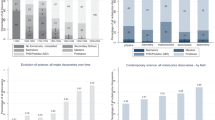Abstract
Motivated by a current development in the physics community, this paper introduces the notion of a least interesting unit (LIU) in research as an investigation that is just interesting enough to pursue. A new general maxim for science is then that a researcher should pursue as many LIUs as possible. Although fulfilling this maxim enhances one’s perspective for a career in the present publish-or-perish academic world, in particular when simultaneously publishing one’s results in the form of as many least publishable units as possible, this paper concludes that it is an example of an unethical practice: it may undermine scientific progress, it may lead to a waste of valuable resources, and it may contribute to an erosion of norms and values in science.
Similar content being viewed by others
Notes
In branches of science like chemistry and biology one virtually always has \({\mathrm{P_{EXP}}} \approx 1\). But in theoretical physics, where much of the work is focussed at the Planck scale, this is not the case.
This is not meant to imply that physics is monolithic: it is not the intention to imply that this is the only development in physics. But this is the one development that motivated the introduction of the least interesting unit.
Van Fraassen has introduced the weaker notion of ‘empirical adequacy’ (1980), but for the present purposes it is sufficient to use the notion of correctness.
It is not the case that this new Maxim necessarily follows from this development in physics: this is not a matter of deduction.
Of course, in a period of what Kuhn called ‘normal science’ a great deal of the research may consist of LIUs. These may even be necessary for progress, e.g. to develop details within a given paradigm. But the present discussion is not about the necessity of doing some LIUs for normal science: it’s about the ethical aspects of doing nothing but LIUs.
References
Amelino-Camelia, G. (2015). Ace in the River. Talk presented at the Planck Scale II conference held from at 9-7-2015 to 9-11-2015 at Wroclaw University, Poland. https://www.youtube.com/watch?v=dYVWtjy9gSE.
Einstein, A. (1918). Prinzipien der Forschung. Talk held at the Physical Society, Berlin, for Max Planck’s sixtieth birthday.
Einstein, A., Podolsky, B., & Rosen, N. (1935). Can quantum-mechanical description of physical reality be considered complete? Physical Review, 47, 777–780.
Refinetti, R. (2011). Publish and flourish. Science, 331, 29.
Roig, M. (2006). Avoiding plagiarism, self-plagiarism, and other questionable writing practices: A guide to ethical writing. New York: St. Johns University Press.
Siegel, D., & Baveye, Ph. (2010). Battling the paper glut. Science, 329, 1466.
Van Fraassen, B. (1980). The scientific image. Gloucestershire: Clarendon Press.
Author information
Authors and Affiliations
Corresponding author
Rights and permissions
About this article
Cite this article
Cabbolet, M.J.T.F. The Least Interesting Unit: A New Concept for Enhancing One’s Academic Career Opportunities. Sci Eng Ethics 22, 1837–1841 (2016). https://doi.org/10.1007/s11948-015-9736-z
Received:
Accepted:
Published:
Issue Date:
DOI: https://doi.org/10.1007/s11948-015-9736-z




